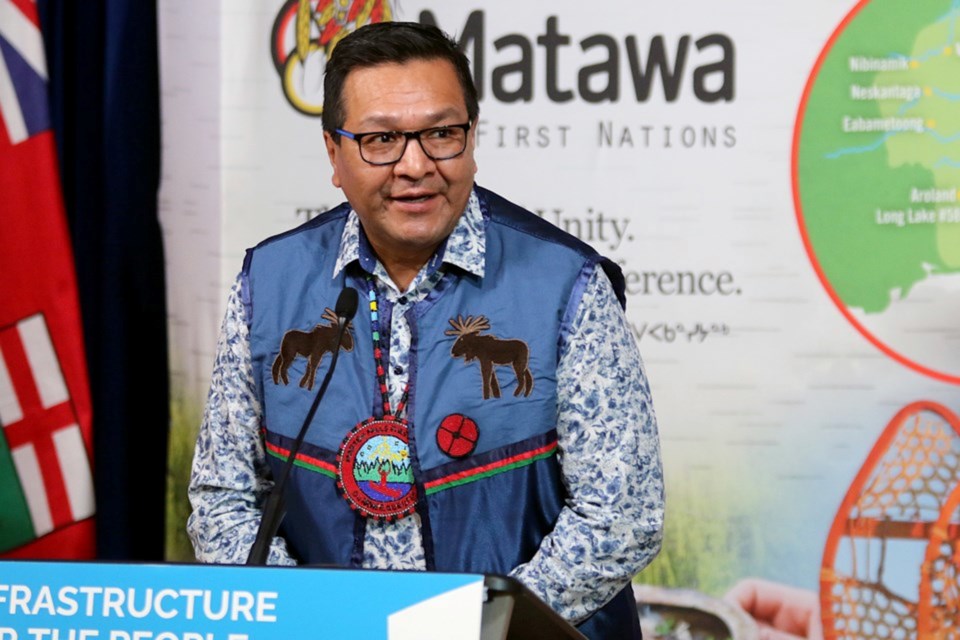The chief of Marten Falls First Nation isn’t opposed to mine development, he’s just cautious about what should be included in any future agreement connected to the Ring of Fire.
Bruce Achneepineskum wants to ensure the provincial and federal governments uphold their side of the bargain and that his remote community in the James Bay region thrives because of its potential involvement.
“We’re not against development, but there are issues that the government has to address.”
He wants to see Marten Fall’s chronic water and housing issues addressed before any mining takes place in the Ring of Fire.
The mineral-rich Ring of Fire in far Northern Ontario spans 5,000 square kilometres and contains deposits of chromite, cobalt, nickel, copper and platinum — minerals critical for information technology, transportation and clean technology. It falls within traditional First Nations territory so partnership agreements will be required.
Marten Falls is a remote community 430 kilometres northeast of Thunder Bay and roughly 100 kilometres southeast of the Ring of Fire deposits.
Before any development can happen, all weather roads will need to be built. Marten Falls and Webequie First Nations have both signed on for environmental assessments for all-weather roads leading to the Ring of Fire.
Both are fly-in communities, so all-weather roads would allow members to access the provincial highway system further south.
“The Ring of Fire is a once-in-a-lifetime opportunity,” he said. “The scale of it is larger than anything that’s even been seen in Northern Ontario, and it’ll affect the rights of our First Nation primarily.”
It’s because of the mining project’s impact on the community that Achneepineskum wants to make sure partners understand the need for comprehensive agreements, spelling out specific details and compensation.
“Large projects that go up there will affect that area forever,” he said.
The mining development would mean changes to Aboriginal and treaty rights, hunting and fishing and the "way of life in the community," he said.
Marten Falls First Nation has a membership of around 900, although only about one-third live in the remote northwestern Ontario community. The remainder are scattered around the Thunder Bay and the Greenstone area.
An all-weather road could mean more people living in Marten Falls.
Achneepineskum said potential population growth would mean added pressure on the community’s existing infrastructure.
According to Achneepineskum, Marten Falls is experiencing a housing shortage. The community is in need of a subdivision for building lots which would help address that. There’s also a need for upgrades to the community’s basic infrastructure like water and sewer services.
Want to read more stories about business in the North? Subscribe to our newsletter.
Achneepineskum said First Nation communities deserve to have their infrastructure projects fully funded.
Infrastructure developments for First Nation communities are funded by Indigenous Services Canada (ISC).
The chief also wants governments to uphold their obligations when it comes to paying out dividends and compensation.
Achneepineskum said they haven’t started negotiating a resource revenue sharing deal with the federal or provincial governments over future resources to be mined, but he is hopeful those talks will come.
When it comes time to negotiate the terms of that agreement, Achneepineskum said he will be thinking about what his community needs. He believes when resources are shared it helps sustain and build up the community partner.
“So that’s what we’re looking for."
On Treaty Day held on Aug. 14, Marten Falls issued a news release reiterating the call for Canada to fulfill its obligations.
Treaty 9 (James Bay Treaty) was signed in the early 1900s between Indigenous nations in Northern Ontario and the Crown which purported to share the land and resources. Over the years there have been challenges and lawsuits connected to the treaty terms. The provincial and federal governments have negotiated settlements with various First Nations to correct historic wrongdoing.
The release called on the federal government “to act with honour, integrity, good faith and fairness in all of its dealings with Indigenous people.”
Achneepineskum said when ancestors signed Treaty 9 they understood it to mean sharing the land and resources, but that never happened. He doesn’t want the same mistake made with the Ring of Fire.
“First Nations are a major rights holder to be consulted with, accommodated and have to give their consent to projects in their territory,” Achneepineskum said. “There has to be a true partnership.
“For far too long we’ve seen the large companies come and have their way with the resources and leave us with the bare minimum, which is very low in terms of growth for the community,” he said using the example of the diversion dams built by Ontario Power Generation in the 1950s.
At the time, First Nation communities got what Achneepineskum called “a small settlement that was not sustainable.”
With the Ring of Fire, though he does see potential benefits like employment and business opportunities, he is equally concerned mining development could damage the land or pollute the environment. It will be a fine balancing act when it comes to negotiating terms for Marten Falls First Nation in the future, he said.
Achneepineskum expects plenty of discussion among the Ring of Fire partners before he or his community signs any document.




